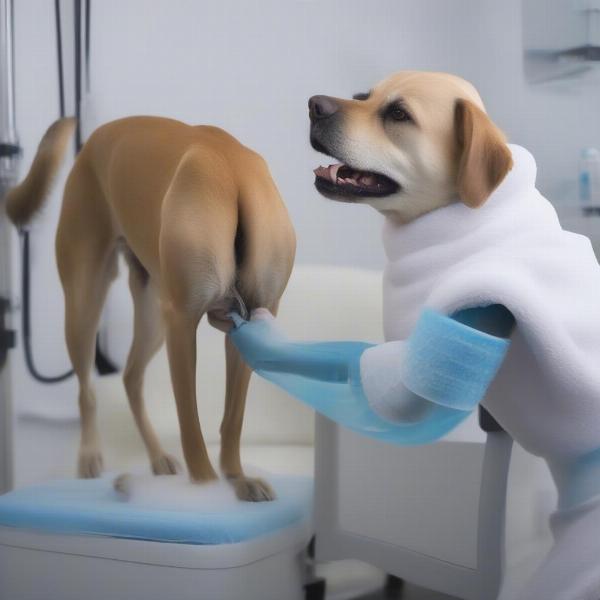Cryotherapy for dogs, also known as cold therapy, is gaining popularity as a non-invasive treatment for pain management and recovery. It involves exposing the body to extremely cold temperatures for a short period, typically using liquid nitrogen or cold air. But is it right for your furry friend? This article will delve into the benefits, risks, and practical applications of cryotherapy for dogs, helping you make informed decisions about your pet’s health.
What are the Benefits of Cryotherapy for Dogs?
Cryotherapy can offer a range of benefits for dogs, particularly in managing pain and inflammation. The intense cold constricts blood vessels, reducing swelling and inflammation in the targeted area. This can be particularly helpful for dogs suffering from arthritis, hip dysplasia, or post-surgical recovery. Additionally, cryotherapy can numb nerve endings, providing pain relief and reducing muscle spasms. Some studies also suggest it can boost the immune system and improve overall well-being.
Is Cryotherapy Safe for all Dogs?
While generally safe, cryotherapy is not suitable for all dogs. Dogs with certain medical conditions, such as circulatory problems, nerve damage, or open wounds, should avoid this treatment. Puppies and senior dogs may also be more sensitive to the cold and require careful monitoring. It is crucial to consult with your veterinarian before considering cryotherapy for your dog. They can assess your dog’s individual needs and determine if it’s a safe and appropriate option.
How is Cryotherapy Administered in Dogs?
Cryotherapy for dogs is typically administered in a controlled veterinary setting. The most common methods involve localized cryotherapy, where the cold is applied directly to the affected area. This can be done using specialized devices that deliver cold air or liquid nitrogen, or by applying ice packs or cold compresses. Whole-body cryotherapy, where the dog enters a chamber filled with cold air, is less common and requires specialized equipment.
What Can I Expect During a Cryotherapy Session for My Dog?
During a localized cryotherapy session, your dog will be comfortably positioned, and the targeted area will be exposed to the cold for a short period, typically a few minutes. Your veterinarian will closely monitor your dog’s reaction to the treatment. Whole-body cryotherapy sessions are usually shorter, lasting only a few minutes. In either case, it’s essential to work with a trained professional to ensure your dog’s safety and comfort.
What are the Potential Side Effects of Cryotherapy for Dogs?
While generally safe, cryotherapy can have potential side effects, including skin irritation, redness, or blistering. In rare cases, more severe complications like nerve damage or tissue death can occur. Always discuss potential risks with your veterinarian and follow their instructions carefully to minimize any adverse effects.
Can Cryotherapy Help My Dog with Arthritis?
Cryotherapy can be a valuable tool in managing arthritis pain in dogs. The cold helps reduce inflammation and swelling in the affected joints, providing much-needed relief. limbal melanoma dog It can also improve mobility and range of motion. Dr. Emily Carter, a veterinary rehabilitation specialist, notes, “Cryotherapy offers a non-pharmacological approach to pain management, which can be especially beneficial for older dogs or those with sensitivities to medications.”
 Cryotherapy for dog arthritis
Cryotherapy for dog arthritis
How Much Does Cryotherapy for Dogs Cost?
The cost of cryotherapy for dogs can vary depending on factors like the type of treatment, the location, and the duration of each session. It’s best to consult with your veterinarian to get a personalized cost estimate.
Can I Use Ice Packs at Home for My Dog?
While applying ice packs at home can provide some temporary relief, it’s not a substitute for professional cryotherapy. Veterinary-administered cryotherapy uses specialized equipment and techniques to ensure safe and effective treatment. Always consult with your veterinarian before trying any home remedies. thuja for dog warts
Conclusion
Cryotherapy can be a valuable tool for managing pain and inflammation in dogs, offering a non-invasive alternative to medication. However, it’s crucial to consult with your veterinarian to determine if it’s the right choice for your furry companion. By understanding the benefits, risks, and applications of cryotherapy, you can make informed decisions about your dog’s health and well-being.
FAQ
- Is cryotherapy painful for dogs? Generally, cryotherapy is not painful. Some dogs might experience a slight tingling sensation, but it should not cause discomfort.
- How often can my dog undergo cryotherapy? The frequency of treatment depends on your dog’s individual needs and condition. Your veterinarian will recommend the appropriate schedule.
- Can cryotherapy cure my dog’s arthritis? While cryotherapy can effectively manage pain and inflammation, it does not cure arthritis. It’s a supportive therapy that can improve your dog’s quality of life.
- Are there any alternatives to cryotherapy for pain management in dogs? Yes, there are other options like medication, acupuncture, and physical therapy. Your veterinarian can help determine the best approach for your dog.
- How long does a cryotherapy session last? Localized cryotherapy sessions typically last a few minutes, while whole-body sessions are generally shorter.
- Can cryotherapy be used for post-surgical recovery in dogs? Yes, cryotherapy can help reduce swelling, pain, and inflammation after surgery, promoting faster healing.
- What are the signs that my dog might be experiencing adverse effects from cryotherapy? Signs of adverse effects include excessive skin irritation, blistering, or changes in behavior. Contact your veterinarian immediately if you notice any of these symptoms.
ILM Dog is a leading online resource for dog owners worldwide, dedicated to providing expert advice and practical information on all aspects of dog care, from breed selection and health to training, nutrition, grooming, and product recommendations. We pride ourselves on delivering reliable, up-to-date content that empowers dog lovers to make informed decisions about their furry companions. Whether you’re a seasoned dog owner or just starting your journey, ILM Dog has the resources you need. Contact us today at [email protected] or +44 20-3965-8624 for more information.